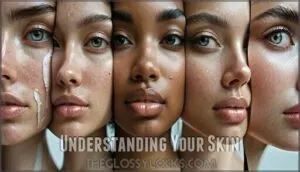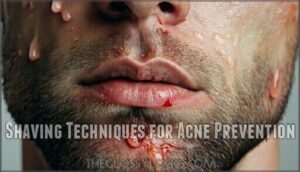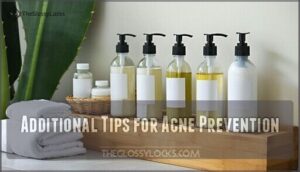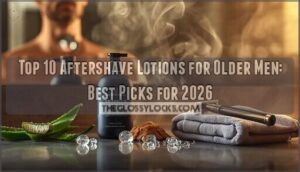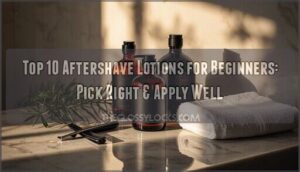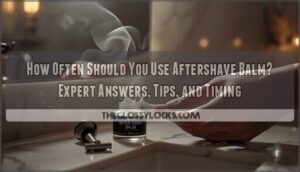This site is supported by our readers. We may earn a commission, at no cost to you, if you purchase through links.
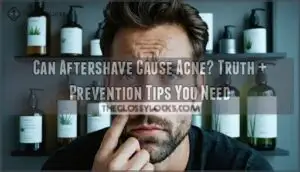
Alcohol-based aftershaves strip your skin’s natural oils, causing your glands to overcompensate by producing excess sebum. This oil buildup clogs pores and creates breakouts.
Your skin type matters too – if you’re already prone to acne, harsh aftershaves can make things worse. However, alcohol-free formulas with soothing ingredients like aloe vera won’t trigger the same reaction.
The key is choosing the right product for your skin and applying it correctly. You don’t have to give up your post-shave routine entirely – smart ingredient choices and proper technique make all the difference.
Table Of Contents
- Key Takeaways
- Can Aftershave Cause Acne?
- Understanding Aftershave Types
- Skin Type Considerations
- Shaving Techniques for Acne Prevention
- Additional Tips for Acne Prevention
- Frequently Asked Questions (FAQs)
- Can aftershave cause acne?
- Does a aftershave irritate your skin?
- Does shaving cause acne?
- Which Aftershave is best for acne prone skin?
- Do aftershaves clog pores?
- Does an aftershave really feel’refreshing’ after a shave?
- Can aftershave aggravate acne?
- How to avoid pimples after shave?
- Is aftershave bad for your face?
- Can a shaver cause acne?
- Conclusion
Key Takeaways
- You’re at risk for breakouts with alcohol-based aftershaves – They strip your skin’s natural oils, causing your glands to overproduce sebum that clogs pores and creates acne.
- Your skin type determines your aftershave tolerance – If you’re already acne-prone, harsh formulas will make things worse, while alcohol-free products with soothing ingredients won’t trigger the same reaction.
- You can prevent shaving-related acne with proper technique – Use sharp blades, shave with the grain, apply light pressure, and follow up with cool water and gentle moisturizer.
- You don’t have to give up aftershave completely – Choose non-comedogenic, alcohol-free formulas with ingredients like witch hazel or tea tree oil that actually help control breakouts.
Can Aftershave Cause Acne?
Looking at your bathroom mirror after shaving, you might wonder if that aftershave bottle is behind your breakouts.
The answer isn’t straightforward, but yes – certain aftershave ingredients can trigger acne.
Pore clogging oils like lanolin and coconut oil found in many aftershave balms create the perfect storm for postshave acne.
These heavy ingredients sit on your skin, blocking pores and trapping bacteria.
Meanwhile, harsh alcohols cause skin irritation that leads to inflammation and shaving acne.
Your skin reacts differently than your friend’s.
What works for them might leave you dealing with acne causes you never expected.
Product selection matters more than you think – the wrong formula can turn your grooming routine into an acne treatment nightmare.
The good news?
Understanding how aftershave affects your skin gives you control.
You don’t have to choose between a smooth shave and clear skin.
The key lies in knowing what ingredients to avoid and which ones actually help prevent aftershave acne.
Understanding Aftershave Types
Different aftershave formulations affect your skin in distinct ways, and choosing the wrong type can trigger breakouts.
You’ll find three main categories of aftershaves on the market: alcohol-based, alcohol-free, and oil-based products, each with specific benefits and potential risks for acne-prone skin.
Alcohol-Based Aftershaves
Alcohol-based aftershaves pack a punch with their antibacterial properties, but they’re often too harsh for your skin.
The alcohol effects include excessive drying, which triggers your skin to produce more oil—hello, aftershave acne!
Here’s what makes these products problematic:
- Irritation potential from harsh alcohols like isopropyl alcohol
- Drying concerns that disrupt your skin’s natural moisture balance
- Ingredient analysis reveals they strip away protective oils
Choose gentler alternatives instead.
Alcohol-Free Aftershaves
When you choose alcohol-free aftershave, you’re selecting gentle formulas that won’t strip your skin’s natural moisture.
These products feature hydrating ingredients like aloe vera and natural extracts that offer soothing properties for sensitive skin.
Witch hazel helps with acne prevention shaving by controlling breakouts.
Best aftershave acne solutions include oil-free balms with tea tree oil for effective aftershave acne management.
Oil-Based Aftershaves
Behind every oil-based aftershave lies a potential acne trigger.
These products contain concentrated oils that can clog pores and cause breakouts, especially for sensitive skin types. Understanding ingredient analysis helps you avoid aftershave comedogenic effects.
Here are five oil-based aftershave concerns:
- Pore clogging – Heavy oils block skin’s natural breathing
- Aftershave breakout risk increases with regular use
- Acne flare-ups worsen in already problematic areas
- Product alternatives exist for safer post-shave care
- Application methods matter less when ingredients cause issues
Skin Type Considerations
Your skin type determines how aftershave will affect your complexion, making it essential to choose products that work with your specific needs rather than against them.
Understanding your skin’s unique needs is the first step to avoiding aftershave breakouts and achieving clear, healthy skin.
Oily skin requires different aftershave formulations than dry or sensitive skin, and using the wrong type can worsen existing acne or create new breakouts, which is why choosing the right product is crucial for your skin.
Understanding Your Skin
Your skin’s unique blueprint determines how aftershave affects you.
Skin pH, skin hydration, and skin sensitivity all influence whether you’ll experience acne or skin irritation.
Pay attention to your skin barrier health and skin microbiome balance.
Acne-prone skin requires gentler aftershave formulas, while oily skin might handle alcohol-based products better.
Understanding these factors helps you choose the right skin care approach.
Consulting a Dermatologist
When aftershave keeps triggering breakouts despite your best efforts, it’s time for Expert Skin Advice from a dermatologist.
These professionals offer Professional Acne Treatment options and create a Personalized Skincare Plan customized to your acne-prone skin needs.
They’ll identify specific ingredients causing skin irritation and determine if your aftershave is the real culprit.
For stubborn acne, they can prescribe Prescription Strength Medication that over-the-counter products can’t match.
When To Consult becomes clear when DIY solutions fail.
Experimenting With Products
Finding the right aftershave requires strategic experimentation.
Start with patch testing new products on your wrist before applying to your face. Product layering can help you build an effective routine, but watch for product reactions like redness or breakouts.
Smart product combinations work better than solo efforts:
- Test antiseptics: Witch hazel, tea tree oil for acne-prone skin
- Try soothing agents: Aloe vera, chamomile for skin irritation
- Consider moisturizers: Glycerin prevents over-drying after shaving
- Avoid pore-cloggers: Skip coconut oil, heavy fragrances
- Monitor product ingredients: Track what triggers your specific skin type
Shaving Techniques for Acne Prevention
Your shaving technique plays a vital role in preventing acne breakouts, as improper methods can irritate skin and clog pores.
By following the right preparation steps, using correct shaving motions, and caring for your skin afterward, you’ll reduce your risk of developing shaving-related acne.
Pre-Shave Preparation
Most men skip proper preparation and wonder why their skin rebels. Start your shaving routine with warm water to open pores and soften hair. Choose a gentle cleanser to remove oil and dirt.
Exfoliation benefits include preventing ingrown hairs by clearing dead skin cells. Apply a heated washcloth to further soften facial hair before shaving.
Many prefer the benefits of warm water systems for a superior shave.
| Preparation Step | Purpose | Time Needed |
|---|---|---|
| Warm water rinse | Opens pores, softens hair | 30 seconds |
| Gentle cleanser | Removes oil and debris | 1 minute |
| Exfoliation | Clears dead skin cells | 2 minutes |
| Heated washcloth | Further softens hair | 2 minutes |
| Preshave oil application | Creates protective barrier | 1 minute |
Shaving Technique
Good prep work means nothing if your shaving technique falls short.
Blade sharpness matters—dull razor blades tug at hairs and create ingrown hairs. Always shave with the grain to prevent irritation.
Apply light razor pressure instead of pressing hard against your skin. Proper shaving also depends on maintaining ideal sharpness for a clean cut.
Keep your tool cleaning routine consistent, and adjust shaving frequency based on how your skin responds to avoid acne flare-ups.
Post-Shave Care
Your shaving technique sets the stage, but post-shave care seals the deal.
Rinse with cool water to close pores and reduce redness relief. Pat skin dry gently.
Apply aftershave alternatives like alcohol-free balms for sensitive skin and moisturizing benefits. Discover options for alcohol-free skincare to further enhance your post-shave routine.
Follow with lightweight moisturizer to prevent ingrown hair formation. This routine keeps acne at bay while soothing freshly shaved skin.
Additional Tips for Acne Prevention
Beyond choosing the right aftershave and perfecting your shaving technique, you can take several extra steps to keep your skin clear and healthy.
These simple adjustments to your routine can make a significant difference in preventing breakouts and maintaining smooth skin after shaving.
Shaving Less Frequently
Your acne-prone skin needs breathing room between shaves. Constant shaving disrupts your hair regrowth cycle and prevents proper skin recovery time.
Try these alternative grooming methods:
- Skip daily shaving for every other day
- Embrace beard styling options during breaks
- Allow 48-72 hours between shaving sessions
- Monitor reduced irritation benefits on your skin
Less frequent shaving gives follicles time to heal naturally and allows for proper skin recovery.
Using Safety Razors
Switching to a safety razor can transform your shaving experience and reduce acne breakouts.
These single-blade tools create less skin dragging than multi-blade cartridges, preventing irritation that triggers breakouts.
| Safety Razor Benefits | Why It Matters for Acne |
|---|---|
| Single blade design | Reduces skin irritation and inflammation |
| Better blade angles | Prevents ingrown hairs that cause bumps |
| Quality razor materials | Lasts longer, stays sharper for cleaner cuts |
The initial investment pays off through improved shaving technique and fewer razor blades needed.
Proper razor maintenance keeps your tool performing at its best, while understanding blade aggressiveness helps you choose the right intensity for your skin type.
Protecting Skin From The Sun
Post-shave skin becomes vulnerable to UV radiation, making sun protection essential for preventing acne flare-ups.
Sunburn can worsen existing breakouts and trigger new ones through inflammation.
Here’s your sun protection game plan:
- Apply SPF 30+ sunscreen with UVA/UVB protection daily, even on cloudy days
- Wear protective clothing like wide-brimmed hats when outdoors
- Avoid peak sun hours between 10 AM and 4 PM
- Reapply sunscreen every two hours for maximum sun damage prevention
Frequently Asked Questions (FAQs)
Can aftershave cause acne?
Like a double-edged sword, aftershave can either soothe or sabotage your skin.
Alcohol-based formulas may overdry and irritate, potentially triggering breakouts.
Oil-heavy balms can clog pores.
Choose alcohol-free, non-comedogenic options for clearer skin.
Does a aftershave irritate your skin?
Yes, aftershave can irritate your skin, especially if it’s alcohol-based.
You’ll likely experience stinging, redness, or dryness on sensitive skin.
Alcohol-free formulas with soothing ingredients like aloe vera are gentler alternatives.
Does shaving cause acne?
Shaving itself doesn’t cause acne, but poor technique can. Using dull blades, shaving against the grain, or skipping proper cleansing creates irritation and clogs pores, leading to breakouts.
Which Aftershave is best for acne prone skin?
Choose alcohol-free aftershaves with witch hazel or tea tree oil for acne-prone skin. You’ll want non-comedogenic formulas that won’t clog pores. Avoid oil-based products and fragrances that can trigger breakouts.
Do aftershaves clog pores?
Think of pores as tiny doorways that can get jammed shut.
Some aftershaves do clog pores, especially creamy balms and lotions containing oils like lanolin or coconut oil, while alcohol-based splashes typically don’t.
Does an aftershave really feel’refreshing’ after a shave?
Aftershave delivers that cooling sensation through alcohol or menthol ingredients that temporarily constrict blood vessels.
You’ll feel refreshed, but it’s mostly psychological – your brain associates the tingle with cleanliness and completion of your grooming routine.
Can aftershave aggravate acne?
Like adding fuel to fire, certain aftershaves can definitely worsen your acne.
Alcohol-based formulas dry out skin, triggering more oil production.
Oil-heavy balms clog pores.
You’ll want alcohol-free, non-comedogenic options instead.
How to avoid pimples after shave?
Use a sharp razor with proper shaving cream, shave with the grain, rinse with cool water, and apply alcohol-free moisturizer.
Clean your razor after each use and replace blades regularly to prevent bacteria buildup.
Is aftershave bad for your face?
While some aftershaves soothe irritated skin beautifully, others can wreak havoc on your face.
Alcohol-based formulas dry out skin, potentially triggering more oil production and breakouts.
Choose alcohol-free, non-comedogenic options for healthier results.
Can a shaver cause acne?
Yes, your shaver can cause acne through dull blades, poor technique, and bacteria buildup. Dirty razors spread bacteria, while pressing too hard irritates skin. Replace blades regularly and clean properly.
Conclusion
While some men avoid aftershave entirely due to breakout fears, others use it daily without issues.
The difference lies in understanding that can aftershave cause acne depends on your skin type and product choice.
Alcohol-based formulas increase acne risk by stripping natural oils, while gentle, alcohol-free alternatives protect your skin.
Choose products with soothing ingredients, maintain proper shaving techniques, and listen to your skin’s needs.
Smart aftershave selection prevents breakouts rather than causing them.
- https://www.badgerandblade.com/forum/threads/aftershaves-that-cause-acne.315950/
- https://www.acne.org/are-aftershaves-safe-to-use-on-acne-prone-skin
- https://www.healthline.com/health/what-does-aftershave-do
- https://www.mydcsi.com/2023/09/27/does-aftershave-prevent-acne-unveiling-the-truth/
- https://www.yoprettyboy.com/blogs/our-thoughts/what-does-aftershave-do?srsltid=AfmBOoogoHzF-8foJTwM4ft3j_jo9vMa0VfLU3JKK2fczeeQhj6dFtaE




